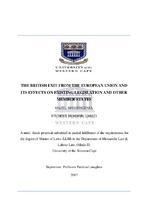The British exit from the European Union and its effects on existing legislation and other member states
Abstract
The European Union (EU) was formed so as to maintain peace and to unify Europe in a bid to
ensure that the events caused by the Second World War would never be repeated again. The
idea was to bring the nations together both economically and politically and to ensure long
lasting peace.
The EU, as we know it today was the brain child of Robert Schuman, who first introduced by
the Schuman Declaration in 1950. The Schuman Declaration became the heart of the European
Coal and Steel Community (ECSC) in 1951. The EU was subsequently created through a
number of treaties with each Treaty and agreement bringing economic and political unity. The
treaties of Rome signed in 1957 fostered economic cooperation. The Single European Act
gave birth to the Common Market thus economic unity to the member states, completing the
four freedoms, the freedom of movement of goods, services, people and money. The
Maastricht treaty of 1992 created the EU because it addressed the measures of security and
defence as well as home affairs. These treaties were followed by the Amsterdam (1997), Nice
(2001) and the Lisbon (2007) treaties, while the community grew from original 6 members to
having 28 member states.

